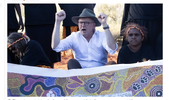- Joined
- 14 February 2005
- Posts
- 15,389
- Reactions
- 17,814
Inner Sydney voters strongly favour the Voice. It’s not enough to make NSW a Yes state
Exclusive polling shows a narrow majority of NSW voters have confirmed their rejection of the Indigenous Voice despite a late rebound in support.
Inner Sydney voters strongly favour the Voice.
And that heading sums up rather a lot of this.
The majority of Australians who don't live in inner Sydney (or inner Melbourne) have had quite enough of those who do thinking they're born to rule the rest of society.
That's not in any way unique to the Voice but it's what's behind a lot of frustration among mainstream Australians on various issues.
There's some incredible irony in those living in the inner city saying others ought have a Voice to parliament. They could do that right now - just stop trying to control every debate.


